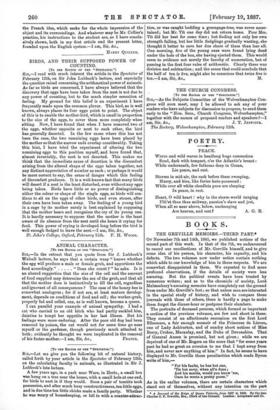ANIMAL CHARACTER.
[To rur Itorrox or Tar “Srscraror."3
Sia,—In the extract that you quote from Sir J. Lubbock's Wa/sall lecture, he says that a certain wasp "knows whether the egg will produce a male or female grub, and apportions the
food accordingly." "Does she count ? " he asks. Is it an absurd suggestion that the size of the cell and the amount of food supplied may determine the sex of the grub, and that all that the mother does is instinctively to fill the cell, regardless and ignorant of all consequences ? The case of the honey-bee is somewhat analogous ; for if not sex, at least mature develop- ment, depends on conditions of food and cell; the worker-grub, properly fed and celled, can, as is well known, become a queen.
I can parallel your example of animal sympathy. I had a cat who carried to an old hitch who had partly suckled, him, dainties to tempt her appetite in her last illness. But his feelings were more enduring. After the poor old dog had been removed by poison, the cat would not for some time go near myself or the gardener, though previously much attached to both; evidently he thought we were implicated in the removal of his foster-mother.—I am, Sir, &c., FBATER.


































 Previous page
Previous page